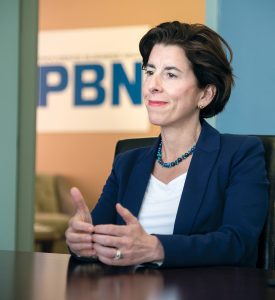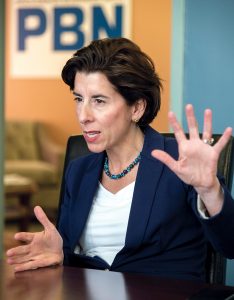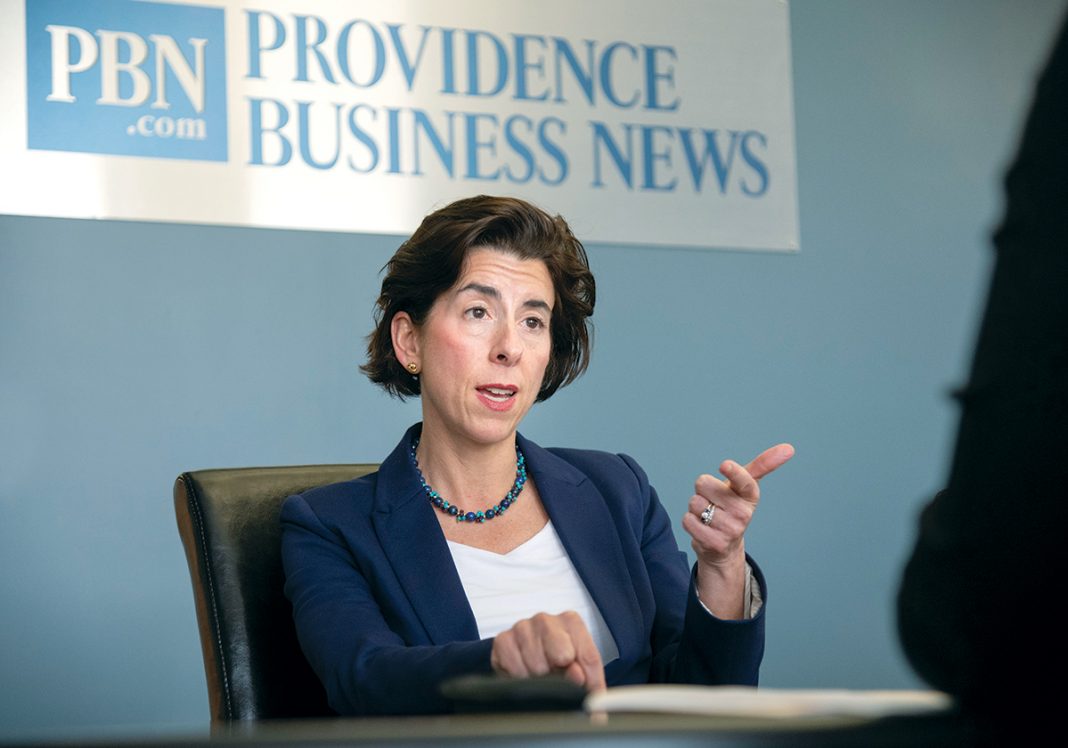When
Gov. Gina M. Raimondo first ran for governor, the state’s economy was beginning to emerge from the impact of the Great Recession, still experiencing sluggish job creation and high unemployment. Since she took office in 2015, numerous bellwethers have improved – most markedly the percentage of Rhode Islanders who are working again.
In her re-election campaign for a second term, she is focused on the statistics that highlight a stronger economy, and what people can see around them – bridges under repair, cranes erecting new buildings and students flocking full time to the state’s community college under a free-tuition program she initiated.
Will it be enough? She faces a challenger in the Democratic Party primary. And polls commissioned by Rhode Island media companies have shown her favorability rating is about 50 percent, with only 37 percent in an April poll giving her a positive job review. Raimondo shrugged off the popularity question when asked about it in a recent interview.
“If you said to me, ‘Our unemployment rate is still 8 percent,’ that would really bother me. If you said to me, ‘Our deficit is still as big as it was when you started,’ that would really bother me. If you said, ‘You’re not doing anything to fix the roads,’ that would bother me. I’m doing my job.”
One of just six female governors in the nation, Raimondo, 47, is running on her public record, not just as governor but also as the former state treasurer. She held the latter post prior to her election as governor in 2014.
As treasurer, she negotiated a series of agreements with the state’s employee unions to reduce pension benefits – an action that still angers many retired state and municipal workers. Supporters and some national observers have cited it as a remarkable achievement, given the pressure on public officials to cut budget expenses without alienating public employees and their politically influential unions.
[caption id="attachment_219312" align="alignright" width="275"]

PBN PHOTO/MICHAEL SALERNO[/caption]
Why are you seeking re-election?
To finish the job. We’ve gone from having one of the highest unemployment rates in the country to having one of the fastest-growing economies in the country. I want that recovery to really take hold and keep it going.
Are you campaigning differently as an incumbent than you were four years ago?
Well, the biggest difference is now I have a record to run on. When I was running, I would say, well, I’m running to create jobs and get people back to work. A lot of people would say, can you really do that? Now we can run on a record of [creating] 15,000 jobs. There [are] cranes in the skyline. There [are] small businesses that are thriving.
Are you sensing that you’re meeting the mood of voters or that optimism has changed, or are they still cynical and depressed?
I would say both. It’s much better than it was. When I was running [the first time], people were really down. I would regularly run into people who had been out of work for a year or two. Now, there is much more optimism.
See PBN's interviews with other candidates:
Former R.I. Sec. of State Matt Brown
Cranston Mayor Allan W. Fung
R.I. Rep. Patricia L. Morgan
Are you doing events or are you doing small meetups?
Everything. In that respect it is easier to be the governor. Everyone knows who you are. Wherever I go, I can talk to people and hear from people. … You can take the kids out for ice cream on a Friday night, and there’s a long line, and you can talk to 50 people. We are doing a lot of community events.
You are facing former Secretary of State Matt Brown in the Democratic primary. You may lose some progressive votes to him. Are you trying to appeal directly to these voters?
The message is the same for everybody. The message is, we’ve made record investments in K-12 education, our economy has more jobs than it’s ever had in its history. We are rebuilding our roads, rebuilding our schools. Rhode Islanders are better off than they were when we started. More people are working. People are making more money. Schools are being rebuilt. We’re finally fixing the roads. I focus on Rhode Islanders: How are they doing, are they better off?
Your early campaign literature seemed focused on Republican challenger Allan W. Fung, the Cranston mayor and 2014 GOP nominee for governor who you defeated. Are you feeling that Brown is not a serious competitor?
Correct.
Why is that?
A few years ago, he didn’t even live in Rhode Island. A few months ago, he was running as an independent, because he said the party system was broken. Suddenly he’s a Democrat. It’s hard to take too seriously.
On unemployment, it has improved under your administration. But income inequality is also pervasive. We still have a lot of jobs that are not producing incomes high enough to rent or buy in the state. How are you addressing those people’s needs?
Last year, Rhode Island had the highest wage growth in America. … That is something to be proud of. The majority of the jobs that have been created since I’ve been governor were at or above the average. But … if you are making $14 an hour and you’re working full time, you are poor. It’s $27,000 a year and it’s not enough. So, what we are doing is we’ve made big investments in job-training programs. That’s a big reason I started the [Rhode Island] Promise program, for tuition-free [at Community College of Rhode Island]. The only solution to that is to get people more skills, so they can get higher-paying jobs.
Are these programs aimed at working adults or young adults?
Both. The CCRI program is young adults. The job-training programs are more [for] working adults. I’ve made huge investments in career and technical education in high schools. At Coventry High School, we have a big welding program. Anyone who goes to that welding program and graduates from high school will get a job at [General Dynamics] Electric Boat. They’ve hired everyone who wants a job. Those jobs are good jobs, with benefits.
[caption id="attachment_219313" align="alignleft" width="300"]

FOCUSED: Gina M. Raimondo is running against Matt Brown in the Democratic Party primary Sept. 12. She’s touting her role in getting Rhode Islanders back to work and efforts to boost job training.
/ PBN PHOTO/MICHAEL SALERNO[/caption]
On the issue of the tax incentives, your opponents have criticized the state’s use of tax incentives, saying too much money is going to large corporations. One of your recent releases indicates 27 companies have relocated or expanded here or said they plan to do so. When is it time to let market forces take over? Are you at a point where you feel the incentives need to be whittled down?
The point that you say that is when that’s what every other state does. Every other state uses these incentives.
If you redirect the money too soon, it means you will lose these opportunities?
It means we can’t compete. Massachusetts has even more-generous incentives. New York, New Jersey, everyone we are competing with has these tools.
So, you don’t think Rhode Island is overdoing it on incentives?
Not at all. And frankly, it is the antidote to [bankrupt] 38 Studios. 38 Studios, which Mayor Fung supported, was the old way of doing things in Rhode Island. One company has a special relationship, runs to the General Assembly and gets a special deal. Before you know it, the taxpayers are out $100 million. That’s the old way of doing special deals for special people. These tax incentives are transparent. Anyone can apply. There are criteria. If you meet the criteria, you get it; if you don’t, you don’t get it. There are no more special, one-off deals. And they were designed to be like best practices of every other state. My view is, nobody likes to use tax incentives. But if it’s what every other state is doing, Rhode Island needs to be in the game, to get our fair share of jobs.
Have you built enough safeguards in that if a company pulls out, the state isn’t losing the money?
This is the other reason why it’s so much better than 38 Studios. No company gets a dime of incentive until the jobs have been created, the people are making money and the people are paying taxes to Rhode Island. The minute that stops, the incentives go away.
[caption id="attachment_219314" align="alignright" width="234"]

IMPROVED STATE: Gov. Gina M. Raimondo said she’s running on a record of creating jobs, investing in education and rebuilding schools, bridges and roads. “Rhode Islanders are better off than when we started. More people are working. People are making more money.”
/ PBN PHOTO/MICHAEL SALERNO[/caption]
Some developers have said the state is not doing enough to support redevelopment outside of Providence. Any fairness to that?
No. Think of it this way. Providence is about half of Rhode Island’s economy. About half of the [gross domestic product] is Providence. So, of course, Providence is going to get more focus than other places. But [recently] I was at a ribbon cutting for a new hotel in Warwick … [and] at the open house for the Citizens Bank headquarters in Johnston. We’ve incentivized affordable housing in West Warwick.
Why won’t you support state Historic Preservation Tax Credit replenishment?
I would support that. It’s just more money.
Can’t you find the money for it?
It’s a challenge and I’m not convinced we need it. What we have now is Rebuild Rhode Island tax credits. It’s a balance, like anything else. It’s true, we need to revitalize historic buildings, and you can use these Rebuild credits for that. But we really need some new buildings. The vast majority, something like 90 percent, of all of Rhode Island’s buildings are from before 1980. We don’t have any new warehouse space, modern work space. You have to strike a balance.
Are you satisfied that Commerce RI is negotiating these deals effectively? I’ve heard complaints from developers that even after the authorization vote is made, it can take a long time, years, until the agreement is reached.
It’s a new program. We can always do better. I will say they do a lot of due diligence and sometimes it takes a long time. I do know that people have complained [that the] process takes too long. The answer to that is, it’s taxpayer money. If you don’t want our money, go someplace else, but we have a process. We’re not cutting short our process of due diligence because it’s taxpayer money.
On the Pawtucket Red Sox ballpark plan, some people felt you did not provide enough leadership on this. There is an argument that had you done that, we wouldn’t be a year and a half into this issue. Did you deliberately take a measured approach on the ballpark?
It’s taxpayer money, so you have to be cautious. I was out in favor of it early. My team negotiated the deal. It [was] held up in the House.
Did you try to get it out of there? Did you speak with House Speaker Nicholas A. Mattiello?
Of course, publicly, privately. But look, there are limits to my authority. Obviously. The problem with that deal is the team did such a bad job in 2015. They asked for too much. It was poorly designed. There wasn’t a good communications strategy. And unfortunately, that just left a very bad taste in people’s mouths.
Your poll numbers are consistently low for an incumbent governor in a heavily Democratic state. The last one in April, by WPRI-TV CBS 12/Roger Williams University, found 37 percent said you were doing an excellent or good job. Why are you so unpopular?
Actually, it’s pretty much the way governors run in Rhode Island.
[caption id="attachment_219315" align="alignright" width="251"]

SKILL-BUILDING: Gov. Gina M. Raimondo said she’s made big investments in job-training programs to help both young and working adults get the skills they need for higher-paying jobs. / PBN PHOTO/MICHAEL SALERNO[/caption]
Why? Is it because of the pension reform?
It could be. I don’t know, governors in Rhode Island run at about that.
On President Donald Trump, you have opposed several of his policies, including family separations at the border. You have said you will not send the R.I. National Guard to the border. And you supported giving driver’s licenses to some immigrants who are not citizens but have federally protected status to stay in the U.S. Are you in favor of giving all immigrants living in the country illegally access to driver’s licenses, which could increase their access to jobs?
Yes. I am.
Some immigration advocates have said you promised that the first time you ran and did not deliver. Is that fair?
In some ways it’s true. I do think all undocumented immigrants should be able to get a driver’s license. Everyone driving should have a license and insurance. The problem is it’s legislative. I can’t do it on my own. It can’t be done by executive order. I need a piece of legislation for it to happen. I’ve lobbied strongly … but both the speaker and the Senate president are against it.
You have reduced corporate taxes. You have reduced unemployment taxes this year. When will the sales tax be a focus for you? Some of your opponents have proposed reducing it by as much as 2 percent. Are you looking at this at all?
If I were to look at the sales tax, it would be part of a bigger restructuring of the sales tax. The way the sales tax is currently structured, in every state, is it is a little old-fashioned, in that no services are taxed, it’s just goods. I’m not going to tell you that this is a top priority for me. I’ve been more focused on things that will improve the business climate for small businesses. I would be more focused on eliminating the corporate minimum tax than the sales tax.
Some people argue that because we have such a long border, that we are losing a lot of business to Massachusetts.
I don’t think that’s true. The difference isn’t that big. Having said that, we should look at our sales tax. I did the Amazon tax. I did that because that was just fair. … Starting last year, we imposed the Rhode Island sales tax on everything you buy online.
You focused last year on relief for college tuition, through the Rhode Island Promise program. Some people have argued that K-12 is in more need of sustained reform. How are you addressing academic improvement?
I would argue both are important. When you tell someone in high school that there is a spot for them in college, even when they can’t afford it, you’re going to see better performance in high school. Because kids have a reason to work harder, to get to college. I know the Promise program will help K-12. I’ve done a lot. I brought about all-day kindergarten for every kid in Rhode Island. … We’ve tripled the number of pre-K public classrooms. We’re one of the only states in the country that teaches computer science in every grade, in every school.
What else is on the to-do list?
We have to focus a lot more on closing the achievement gap between the haves and the have-nots, and kids of color and white kids. We have to focus on urban schools, Providence, Pawtucket, Central Falls.
Your leadership was questioned on the Unified Health Infrastructure Project. Many people felt you acted too quickly to implement the new computer system and then were slow to react when it failed. What is it going to take to fix this?
We did go live too soon. That was a mistake that I have acknowledged. I’m not a software expert. I asked every way I knew how. Are you sure this is ready? Did we do enough testing? And they told me over and over again, absolutely, it’s ready to go.
Were they telling you what you wanted to hear?
One of the first things I did was I fired the state’s chief technology officer. He was our technology expert. This was a technology problem. Deloitte sold us a product that was terrible and not ready and someone should have told us, someone who could read software code should have said don’t do it.
You’ve expressed concern about immigrant children on the border. But within our own state, you had young children without access to food stamps due to the UHIP problems.
But they do now and they have for a long time. We are paying food stamps accurately and on time.
How much is this going to hurt you in the campaign?
I don’t know. I need it to work. I feel so bad for the workers. The state employees who have had to live through a year, working with a system that’s terrible. I feel bad for the families, and the nursing homes who have had to wait. At this point, I just have to stay on it and make sure it’s the way we need it to be.
What is your position on a $15 minimum wage?
I support increasing the minimum wage. I’ve proposed three consecutive minimum-wage raises in Rhode Island. I’m the only Rhode Island governor to ever do that and I intend to raise it again.
RhodeWorks has just started – and still has its critics. How can you make a better case to business that transportation networks need to be improved to sustain growth in R.I.?
Actually, Rhode Islanders are very happy our crumbling roads and bridges are finally being fixed. It’s a popular program – we’re creating jobs, rebuilding our state and attracting business.
What can you do to promote more supply of affordable housing across Rhode Island?
All Rhode Islanders deserve to live somewhere that’s safe and warm. We passed $50 million in affordable housing bonds in 2015, creating hundreds of new affordable housing units.
Medicaid cuts have been a centerpiece of your budgets, to rein in costs. You are under criticism now for hurting vulnerable families. How do you respond to that?
These claims are simply not true. I have always and will always stand up for Rhode Islanders’ access to health care. We did not cut health care benefits or eligibility for Medicaid recipients and Rhode Islanders’ quality of care is improving.


















In my opinion the economy is good because of a Trump presidency- not because of raimondo or anything she did (massive screw-ups and spending on her part) Nationally the Republicans have certainly produced. Taxes are lower and the deficit shrinking. Jobs are up. Unemployment for virtually every group has dropped to the lowest levels on record. The stock market is flying high, Economic growth is at 4.1 percent. Trade imbalances are shrinking and Trump is making deals worldwide. Bodies from the Korean war are coming home. War seems far less likely now than a year ago. She can’t take credit for what she didn’t do but she will lie and said she did!